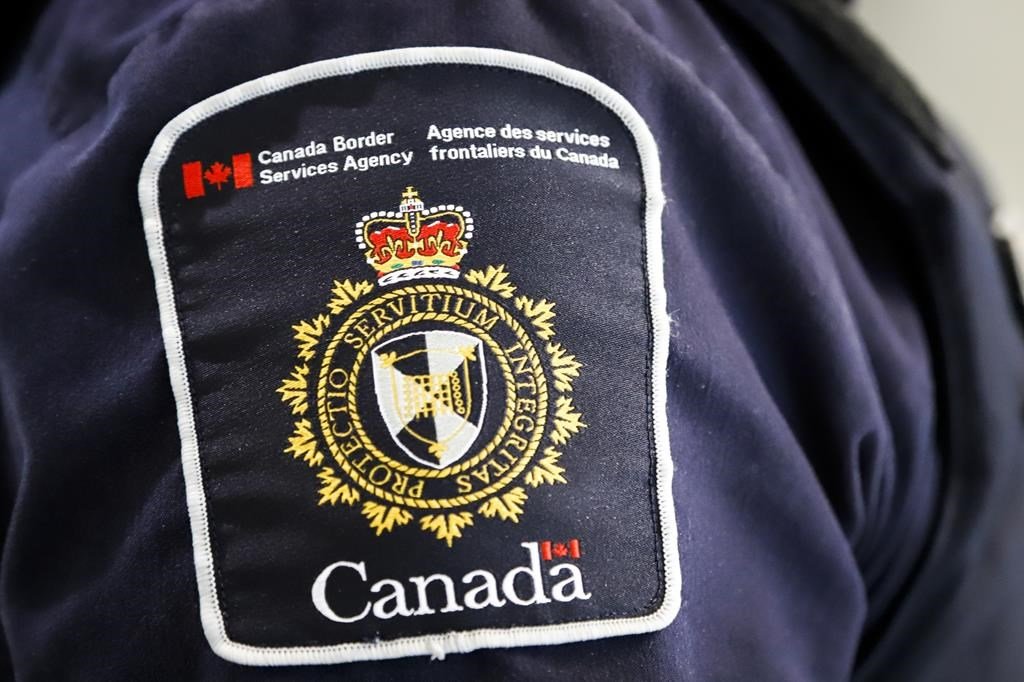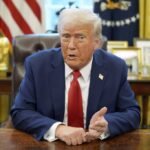The trade war between Canada and the United States is on pause after Prime Minister Justin Trudeau agreed Monday to new measures addressing President Donald Trump’s concerns over fentanyl trafficking across the border, including the appointment of a “fentanyl czar.”
The Canadian government moved swiftly to speak about the promise on Tuesday.
“What is our objective today? Stop the tariffs. We are going to do what we have to do in order to strengthen this border…because there is so much on the line for everyday Canadians,” Public Safety Minister David McGuinty said at the Emerson, Man., border on Tuesday.
“The prime minister signed a new intelligence directive on organized crime and fentanyl that will be backed by a $200 million investment. We are going to be appointing our first fentanyl czar— the words are chosen carefully—who will serve as the main interlocutor between the Canadian and U.S. governments and enhance our collaboration in combating fentanyl.”
2:21
Trump tariffs: US president says fentanyl coming through Canada is ‘massive’
Trump has previously pointed to the flow of illegal fentanyl into the U.S. as a primary reason for imposing broad tariffs on Canada and Mexico.
However, Trudeau and McGuinty have said less than one per cent of fentanyl entering the U.S. comes from Canada.
When Trump announced tariffs on Canada on Saturday and Canada hit back with $155 billion in retaliatory measures, tensions escalated, with the threat of a full-blown trade war looming in the background.
But a Monday afternoon phone call between Trump and Trudeau appeared to ease tensions for now.
In a statement about the discussion, Trudeau said he agreed to new border security measures, leading to a 30-day pause on tariffs.
“Canada is making new commitments to appoint a Fentanyl Czar, we will list cartels as terrorists, ensure 24/7 eyes on the border, launch a Canada- U.S. Joint Strike Force to combat organized crime, fentanyl and money laundering,” Trudeau said in a social media post.
The concept of a “border czar” in Canada has been raised before.
On Jan. 29, Alberta Premier Danielle Smith said Ottawa should appoint a “border czar” to work collaboratively with the U.S.
Speaking to reporters, Smith said a Canadian border czar would work alongside Tom Homan, Trump’s choice for the U.S. border czar, to address fentanyl trafficking and illegal crossings — issues Trump has repeatedly called major concerns.
Smith said having a border czar, on top of a $1.3-billion border security plan pledged by Ottawa in the fall economic statement, would further help Canada’s chances to avoid the tariffs that Trump has threatened to impose on Saturday.
She suggested that a retired military general would be ideal for the role and expressed her support for Alberta’s interim top bureaucrat, Paul Wynnyk, as the candidate. Wynnyk, a longtime public servant, has served as Alberta’s deputy minister of health and municipal affairs following his 38-year career in the Canadian Armed Forces.
Authority over the border is not in the hands of the Canadian military. The border is managed by the Canada Border Services Agency, and the Royal Canadian Mounted Police.
1:59
Danielle Smith calls on Canada to name ‘border czar’ as tariffs loom
Mitchel Sollenberger, a political science professor at the University of Michigan-Dearborn, noted that the term “czar” has been used in the U.S. since the 20th century, including the creation of a “baseball commissioner czar” in the 1920s, a “homeless czar” appointed by George W. Bush in 2002 and a “homeland security czar” after the Sept. 11, 2001, terrorist attacks.
He added that the title was a way to grab the media’s attention and create buzz about a new position of power, “similar to the Romanovs.”
Trending Now
Musk Starlink deal with Ontario government back on hours after threat to rip it up
Made in Canada vs. Product of Canada: Know the difference to ‘Buy Canadian’
“But it is not a formal title and not a formal role and it usually does not have any formal powers. Some of these positions can be very ceremonial. But they can have significant power too,” Sollenberger said.
“Creating a czar title is a way for presidents to cut through bureaucratic tape. A lot of times they’re muddying the water on what is expressly allowed in law and what’s sort of a gray area,” he added.
For example, while Homan is the U.S. pick for border czar, it’s still unclear how much power he will have and what he will be able to accomplish.
Whether he will be granted additional authority remains uncertain, Sollenberger said.
Trudeau’s decision to create a fentanyl czar in the wake of these threatened tariffs reflects “good diplomacy,” Sollenberger said.
“This seems to be a step in that kind of direction to placate the American administration,” he said.
It’s still unclear how much power this position will hold or who will lead it, but Sollenberger remains skeptical about whether it will bring any real change at the policy level.
“It’s more of a political solution, and I think it’s probably a smart move. However, when titles like this are rolled out so quickly with little fanfare—just nuggets of thoughts—and are primarily responding to a political issue rather than addressing policy thoughtfully, it seems lacking,” he said.
1:52
Trump taps Tom Homan as border czar, Elise Stefanik as UN ambassador
In an email to Global News on Tuesday, Stephen Schneider, a criminology professor at Saint Mary’s University in Halifax said the role would likely be a position within the Canadian government responsible for overseeing and coordinating actions related to fentanyl, including policy and legislation.
That role would not be able to overtake the authorities or responsibilities that are under the powers of ministers, however. The public safety minister is responsible for the CBSA and the RCMP, and for introducing and developing any legislation through the departments that support that ministry that cover any changes to those agencies.
Although this term is “ubiquitous in America,” he said he believes it reflects the Trump administration’s desire to exert greater influence over Canada’s domestic fentanyl control efforts.
“The American proposal that Canada create the position of a fentanyl czar is still unclear,” he said.
–with files from the Canadian Press


